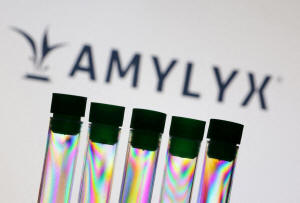FDA greenlights Amylyx's ALS drug
 Send a link to a friend
Send a link to a friend

(Reuters) -Amylyx Pharmaceuticals Inc said
on Thursday the U.S. Food and Drug Administration approved its drug for
slowing progression of ALS, or amyotrophic lateral sclerosis, and
potentially delaying death, sending shares of the company up nearly 14%
in extended trading.
The company added healthcare professionals can soon write prescriptions
for the drug, to be sold under the brand name Relyvrio, even as it works
on the launch.
"We know people living with ALS have no time to wait and, for this
reason, Amylyx is prepared to move quickly with commercialization in the
U.S.," Co-Chief Executive Officers Josh Cohen and Justin Klee said in a
statement.
Amylyx's drug is a combination of generic compounds sodium
phenylbutyrate and taurursodiol that work together to prevent nerve
cells in the brain and spinal cord from dying prematurely.

ALS, also known as Lou Gehrig's disease, breaks down nerve cells in the
brain and spinal cord that make muscles work, leading to progressive
paralysis and death. It affects more than 30,000 patients in the United
States, according to patient advocacy group ALS Association.
'NOT A MAGIC TREATMENT'
The average life expectancy of ALS patients is between two and five
years, but some patients, such as Stephen Hawking, have lived for much
longer.
"I think we are all aware this drug is not the magic treatment that is
going to cure the disease, but will hopefully slow its progression,"
said Dr. Jinsy Andrews, associate professor of neurology at Columbia
University Vagelos College of Physicians and Surgeons, ahead of the
approval.
Andrews, an investigator in Amylyx's ongoing late-stage trial, added
there was consensus across the ALS patient community that better
treatments would be developed going forward.
Amylyx's drug has already been granted conditional approval in Canada,
in June. Relyvrio becomes the third ALS drug to be approved by the FDA
after Japanese firm Mitsubishi Tanabe's Radicava and the generic drug
riluzole.
[to top of second column]
|

Test tubes are seen in front of Amylyx
logo in this illustration, July 24, 2022. REUTERS/Dado Ruvic/Illustration/File
Photo
 Goldman Sachs analyst Chris
Shibutani earlier this month said he expects a strong adoption of
the drug from the start and forecast annual sales reaching $767
million in 2026.
SVB Securities analyst Marc Goodman forecast U.S. sales of over $1
billion for Amylyx's drug in 2026.
A RARE REVERSAL
Amylyx's case for approval was built on a recent analysis of
clinical trial data it said showed the drug slows progression of the
disease and extends life expectancy by nearly 10 months. Earlier
this month, the FDA staff expressed concerns the additional analysis
came from the same small mid-stage trial as initial data and could
not be considered as a confirmation of the drug's benefits.
The agency's decision follows an approval recommendation, a rare
reversal, from an outside panel of advisers which was reconvened in
September to look at the new data analysis. The panel had previously
recommended against the approval of the drug in March.
Billy Dunn, head of the FDA's Office of Neuroscience which reviewed
the drug, had urged the advisers to consider "regulatory
flexibility" in making their decision, saying the drug could be
pulled from the market if it failed in a larger trial currently
underway.

The FDA decision also follows months of lobbying by patients who
urged the regulator to approve the drug based on its relative safety
and the potential for increased survival.
(Reporting by Leroy Leo and Bhanvi Satija in Bengaluru; editing by
Caroline Humer, Bill Berkrot and Krishna Chandra Eluri)
[© 2022 Thomson Reuters. All rights
reserved.] This material may not be published,
broadcast, rewritten or redistributed.
Thompson Reuters is solely responsible for this content. |